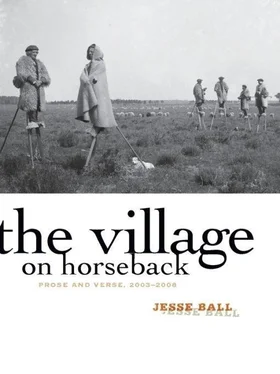Jesse Ball - The Village on Horseback - Prose and Verse, 2003-2008
Здесь есть возможность читать онлайн «Jesse Ball - The Village on Horseback - Prose and Verse, 2003-2008» весь текст электронной книги совершенно бесплатно (целиком полную версию без сокращений). В некоторых случаях можно слушать аудио, скачать через торрент в формате fb2 и присутствует краткое содержание. Год выпуска: 2011, Издательство: Milkweed Editions, Жанр: Современная проза, Поэзия, на английском языке. Описание произведения, (предисловие) а так же отзывы посетителей доступны на портале библиотеки ЛибКат.
- Название:The Village on Horseback: Prose and Verse, 2003-2008
- Автор:
- Издательство:Milkweed Editions
- Жанр:
- Год:2011
- ISBN:нет данных
- Рейтинг книги:5 / 5. Голосов: 1
-
Избранное:Добавить в избранное
- Отзывы:
-
Ваша оценка:
- 100
- 1
- 2
- 3
- 4
- 5
The Village on Horseback: Prose and Verse, 2003-2008: краткое содержание, описание и аннотация
Предлагаем к чтению аннотацию, описание, краткое содержание или предисловие (зависит от того, что написал сам автор книги «The Village on Horseback: Prose and Verse, 2003-2008»). Если вы не нашли необходимую информацию о книге — напишите в комментариях, мы постараемся отыскать её.
Samedi the Deafness
The Way Through Doors,
New Yorker’s
The Village on Horseback
The Village on Horseback: Prose and Verse, 2003-2008 — читать онлайн бесплатно полную книгу (весь текст) целиком
Ниже представлен текст книги, разбитый по страницам. Система сохранения места последней прочитанной страницы, позволяет с удобством читать онлайн бесплатно книгу «The Village on Horseback: Prose and Verse, 2003-2008», без необходимости каждый раз заново искать на чём Вы остановились. Поставьте закладку, и сможете в любой момент перейти на страницу, на которой закончили чтение.
Интервал:
Закладка:
16
Why do I always return to the forest path again and again? The forest path, the forest path with all its attendant resources — the hiding of animals, of people, the dangers, the dimness at midday while near in a clearing the shuddering of full day and dens and burrows beautiful beneath the ground how long days seem when they reach and reach again to their full length and stretch themselves so kindly along the forest path! Shall we go then now and see? Would that I was not so far from the forest. Would that even now I might see with these old eyes the forest path.
You laugh at my odd bearing, my pauses in speech. You smile at my uncouth abode. Yes it is true, I live in what might be called a meager hut in a filthy dell, set in a wood between hither and yon. Yes it is true, I wriggle in my disguise and seek with each breath to escape. I was, you know, once a fox. Someone tricked me into this human shape and here I will remain until I die. A little girl told me once words of comfort:
you’ll be a fox again when you’ve gone to your grave.
It cost her nothing to say it, but for me it was a matter of great pain.
17
At the hurdy-gurdy factory, the Master-Builder was selecting melodies. His office was like the inside of a massive harp. Everything was possible with him. One was afraid even to move.
— Sir, I yelped.
I was waving some letter, some nonsensical letter. I don’t even know where it came from, but it was very dirty, and distasteful even to hold.
— Sir, I yelped. Sir!
But that day was soon finished, and the one after it, and now things have gone so far I can’t even say whether this was my memory or my grandfather’s, the violent man whose grave I share.
And with waking now upon a particular morning and before you, worlds and doors locked once, left open, particular and inconceivable. Shall we go out this way and down the avenue? shall we enter by the garden gate and slip up the unlocked stair to the room beneath the roof? the unkempt room that once was let to German boarders, young men and such, engaged always in the study of some or another mathematics?
18
Licorice. . it was considered a poison by the Romans, and acted in fact, quite well in this regard, save that, as it possesses none of the qualities of a true poison, its victims would have to be informed of their fate. This led to scenes that were often parodied by persons blessed by history with a better understanding. Yet think of this, and think clearly for once — the taste of licorice. . does it not recall to you something? Its taste is misplaced. Somewhere, an error was made and never rectified. The question nonetheless remains, who first discovered its safe use in confections? Thousands of people must have died before some tribune or proconsul proclaimed it safe. And then, how confusing a thing it must have been to the survivors. How sad the fate of those reached last by the news, some proud couple living in a manse on the far frontier, self reliant, comforted by their own strength. The messenger finds only their bodies. I don’t believe anyone knows any more about this.
It has been long believed that wind is due to pressure differences in the air. However, the recently published research of Ch. Stevens of Greenwich has called this theory into question. Through painstaking observation he has noticed that while pressure differences seem to account for wind, they only approximate how wind might be, leaving us with two possible conclusions — the first that it is not pressure at all that determines wind, but something else entirely, and the second, that some common thing determines and influences both wind and pressure differences, and that the discrepancy between the two is caused by the influence of some third factor. The question then, what is the third factor, has been the work of Stevens’ life. He discovered the discrepancy as a child poring over charts, but told no one for sixty-five years as he set about cementing his theory of the THIRD FACTOR.
The THIRD FACTOR is, Stevens believes, observation by man or animal. His thesis in particular explains the sudden escalation of tornadoes and tsunamis which hitherto have been scientifically unexplainable. Furthermore, Stevens has posited an enormous sea eye lying at or near the center of the fabled Bermuda triangle.
19
said the soldier to the grackle king:
I am glad of this theatre you so joyously provide, for I travel by foot and by picturing myself still farther down these roman roads.
20
I drew you aside once, do you remember it? We were young — you four, I three, we had been put for safekeeping in the charge of a farmyard. Everyone was cruel and we couldn’t see why. We went apart to a shallow ditch in the back of a goose pen and sat in the shade of wet ground. I don’t remember what was said but there was much. We talked all day and into the night, and the searchers discovered us by the moon’s broken spokes. I often think of that conversation, often feel my life has been the length of those words, those scratched diagrams and shapes in mud. Did we leave the wiser? What did I tell you, so important, a thing I now don’t know save in mourning and loss?
21
The apologies rendered me by the provincial mayor were, I must say, quite insufficient. I coughed merely and looked into my sleeve while his aide de campe blanched at the insult done. But what matter is it to me? If I choose I may change into a cloud or a stone and sleep for a century until all living are now dead. I have done so before and there is no trouble involved. Only an undoing of buttons, an unhooking of hooks, a light wheeling of countenance here and then about.
22
The red cloth that you named Garment Beamer and how you wrapped all your things in it, so many and joyful, and went with me gladly as I sang a song of warders and the wide advance. We climbed a well and were lost to what we knew. Then, afterwards, the day of whistled faces and crowns, the lunches prepared in our honor by a man we had seen once in a shop and thought vaguely respectable.
23
In a dream, I come upon a sort of paramilitary canteen. An attack is being readied. People of all sorts, dressed in civilian garb are standing about, remonstrating with each other, preparing themselves. There are great quantities of weapons, presided over by older men, precise fellows of a Swiss type. There was a place to be shoed, a place to be jacketed, belted, etc. Shall I say that the guns were quite odd? Most were of a sort, as was explained to me — oh, I should say first, just then everyone left. It had begun. I was standing there, and the great mass of people left the place of armament and went off into the town. The sound of gunfire came from almost every direction. Still, in the armory I felt quite safe. I talked with one of the men who explained that these weapons they were distributing were of a peculiar sort fit for revolution. They were three shot pistols, firing shotgun shells. They could not be reloaded. Once the pistol was done, perhaps recourse to a knife? I did not ask him this. The main thing is, the pistol could also be used as a grenade, in which case all three shells would explode simultaneously. — Very effective, he explained. No one will have predicted this.
As a kindness he provided me with an old Remington break-barrel shotgun with which to make my way East. It was predicted the countryside would rise. But if they did not?
24
Интервал:
Закладка:
Похожие книги на «The Village on Horseback: Prose and Verse, 2003-2008»
Представляем Вашему вниманию похожие книги на «The Village on Horseback: Prose and Verse, 2003-2008» списком для выбора. Мы отобрали схожую по названию и смыслу литературу в надежде предоставить читателям больше вариантов отыскать новые, интересные, ещё непрочитанные произведения.
Обсуждение, отзывы о книге «The Village on Horseback: Prose and Verse, 2003-2008» и просто собственные мнения читателей. Оставьте ваши комментарии, напишите, что Вы думаете о произведении, его смысле или главных героях. Укажите что конкретно понравилось, а что нет, и почему Вы так считаете.












